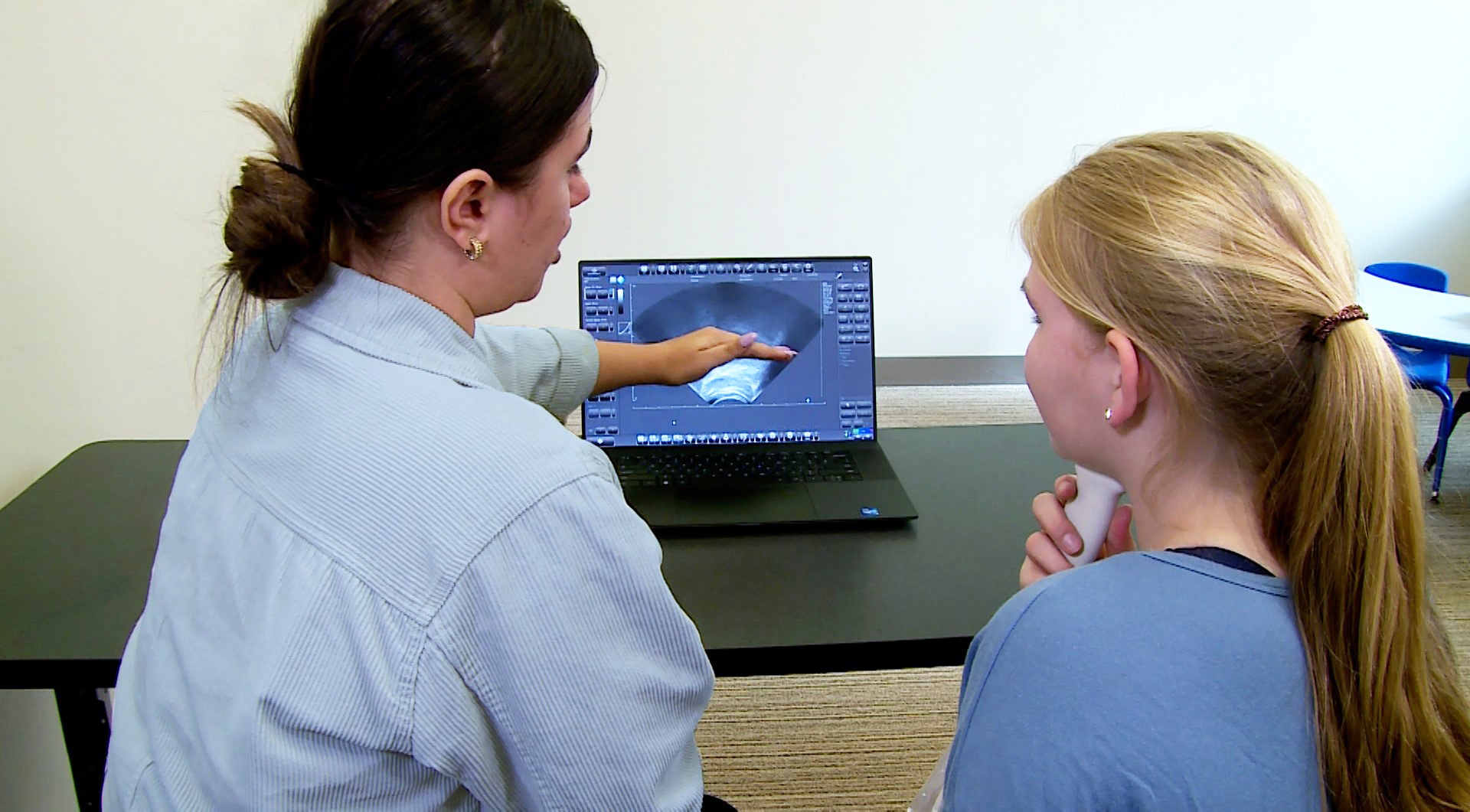What is Vocal Hygiene?
Vocal hygiene is a term used to describe habits and routines used to support a healthy and strong voice. Just as good oral hygiene can help protect your teeth as you age, vocal hygiene can help you preserve a strong, resonant voice.
Vocal Hygiene Tips
1. Drink More Water: Try a minimum of eight 8 oz glasses of water or other noncaffeinated non-acidic beverage per day, avoid consumption of alcoholic beverages. (NOTE: please speak with your medical provider to ensure consumption of a higher volume of water will not impact any medications you are currently taking.)
Read More
Tags:
Speech,
Language,
Communication,
Voice,
talking,
Speech therapy
Many parents who have a child who is d/Deaf or hard of hearing (DHH) hope their child will learn to talk. These parents are often hesitant to introduce American Sign Language (ASL) into their home. They may worry that learning ASL will discourage their child from talking. However, a recent study published in the Journal of Speech, Language, and Hearing Research by Pontecorvo and colleagues* shows that this worry is not necessary. The study is titled Learning Sign Language Does Not Hinder Acquisition of a Spoken Language. This is a very important study because it found that learning ASL does not mean a child will not learn to talk!
The study is titled Learning Sign Language Does Not Hinder Acquisition of a Spoken Language. This is a very important study because it found that learning ASL does not mean a child will not learn to talk!
Read More
Tags:
Speech,
Communication,
American Sign Language,
ASL
Read More
Tags:
Speech,
Language,
Communication,
Support,
Stroke,
Caregiving,
Brain Injury,
talking,
Communication Access,
Speech therapy,
Stroke recovery,
Aphasia,
Primary Progressive Aphasia
Those caring for adults with speech, language, and cognitive challenges serve an important role in the healthcare management team. These challenges may be a result of medical diagnoses such as dementia, stroke, and ALS, or occur independently. No matter the etiology, support is often necessary to help individuals reach their goals. Due to the nature of this role, we are beginning to shift our perspective on how to most effectively refer to these individuals: care partner vs. care giver.
Read More
Tags:
Speech,
Language,
Communication,
Support,
Stroke,
Caregiving,
Brain Injury,
talking,
Speech therapy,
Stroke recovery,
Aphasia,
Primary Progressive Aphasia
If you know someone who is recovering from a stroke or other acquired brain injury, you may have experienced a heightened level of difficulty when participating in conversations. Aphasia, or language difficulties as a result of a stroke, can impact a person’s ability to express themselves or understand information. This breakdown in communication can lead to feelings of isolation and distress.
Read More
Tags:
Speech,
Language,
Communication,
Support,
Stroke,
Caregiving,
talking,
Communication Access,
Speech therapy,
Stroke recovery,
Aphasia

Language is how a mother tells her baby "I love you" with a sing-song voice. It's how a 3-year-old tells a knock-knock joke while trying to hold back their laughter. It's how a teacher explains the rules of long division to her fidgety students. Language connects us, and language helps us learn.
At the most basic level, language is a set of symbols that a community has agreed upon to stand for objects and ideas. You use these symbols to talk listen, read, and write. In the case of American Sign Language, you use language to produce signs and interpret signs. Having effective language skills means that you can express your ideas and can understand when others express their ideas. Language is uniquely human, and babies begin to build the foundation for language even before they are born!
It can be helpful to think about the difference between language and speech. When your child says "I wuv my wed twuck," (I love my red truck), it doesn't sound right - that's the speech part - but she is sharing her thoughts on something she really likes - that's the language part.
Language includes which words you know and which words you chose to use. It is how you put those words together, the tone of voice that you use, and whether the person across from you understands what you mean. You use language to solve story problems in math class and write an essay in English class. Language skills are what allow you to build relationships with your family and friends.
Not having access to language is frustrating. Imagine being dropped in the middle of a foreign country with a pounding headache. You need to find a drug store, but how would you communicate what you need? How would you understand directions if someone did figure out what you were trying to say? You're in pain, you're confused, and you can't get your problem solved.
Now think of a two-and-a-half-year-old boy who doesn't yet say any words. His head is full of wants and needs, but he has no clear way of letting others know what they are. He also has trouble understanding what his parents want him to do when they give him simple directions. He often throws things when he can't be understood or doesn't understand what his parents want him to do. All of this is because he has difficulty with speaking and listening, that is, with language.
Language underpins everything we do, and having difficulty with language skills at any age means you can't fully participate in everyday life. Cleveland Hearing & Speech Center has a team of licensed speech-language pathologists (SLPs) with expertise in building language skills.
Read More
Tags:
Speech,
Language,
Communication,
literacy,
Learning,
Voice,
toddler,
talking,
Early Intervention,
Speech therapy
Communicating with someone recovering from a stroke or maintaining skills after a neurodegenerative diagnosis may be difficult. Changes in communicative abilities can be either expressive (the ability to speak or communicate) or receptive (the ability to understand spoken or written information), leading to breakdowns in communication. Any changes in communication can lead to feelings of frustration, isolation, or distress. We offer some fun summer activities to help practice word-finding and repair communication breakdowns. These activities require little if any, materials or preparation to engage!
Read More
Tags:
Speech,
Language,
Communication,
Stroke,
Brain Injury,
talking,
Speech therapy,
Stroke recovery,
Aphasia
Take your time when speaking. Speak at your own pace. Even if your communication partner is speaking quickly, set your pace and take your time. Your message is important and deserves to be heard.
Read More
Tags:
Speech,
Language,
Communication,
Support,
Stroke,
Caregiving,
Brain Injury,
talking,
Communication Access,
Speech therapy,
Stroke recovery
Does your child struggle with producing the “r” sound? Do they have a slushy “s” sound? If this is true for your child who is 8 years of age or older, they have what is called residual speech sound disorder (RSSD). Many children with RSSD have been in years of therapy with little to no improvement in their speech. This can be frustrating and discouraging for both the child and their parents.
Read More
Tags:
Speech,
Language,
Communication,
talking,
Speech therapy,
ultrasound,
ultrasound speech therapy,
R speech therapy
Communicating with someone after they have had a stroke, brain injury, or other illness resulting in communication difficulties can be challenging. These difficulties can be either expressive (the ability to speak or communicate) or receptive (the ability to understand spoken or written information), leading to breakdowns in communication. Any changes in communication can lead to feelings of frustration, isolation, or distress. Making a few changes in the way you communicate can make a world of difference!
Read More
Tags:
Speech,
Language,
Communication,
Stroke,
Caregiving,
Brain Injury,
talking,
Speech therapy,
Stroke recovery
















